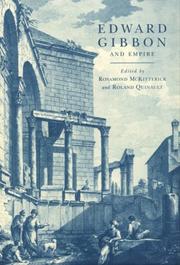| Listing 1 - 3 of 3 |
Sort by
|

ISBN: 0521497248 0521525055 0511599498 Year: 1997 Publisher: Cambridge New York Melbourne Cambridge University Press
Abstract | Keywords | Export | Availability | Bookmark
 Loading...
Loading...Choose an application
- Reference Manager
- EndNote
- RefWorks (Direct export to RefWorks)
This book examines Gibbon's interpretations of empire and the intellectual context in which he formulated them against a background of the eighteenth- and late twentieth-century knowledge of late antiquity and the Middle Ages. Gibbon's ideas of empire, his understanding of monarchy and the balance of power, his sources and working methods, the structure of the History of the Decline and Fall of the Roman Empire, his attitude towards the barbarians, the contrasting treatments of the eastern and western Empire, his appreciation of past civilizations and their material remains, his audience and their reactions - contemporary and Victorian - are considered in the light of the latest research on eighteenth-century intellectual history on the one hand and on late antiquity, Byzantium and the Middle Ages on the other. The book breaks new ground in taking the form of a dialogue between experts on the fields about which Gibbon himself wrote, and eighteenth-century intellectual historians.
Historians --- Scholars --- Historiens --- Savants --- Biography --- Biographie --- Gibbon, Edward, --- Views on Rome --- Et Rome --- Byzantine Empire --- Great Britain --- Rome --- Empire byzantin --- Grande-Bretagne --- Historiography --- Intellectual life --- History --- Historiographie --- Vie intellectuelle --- Histoire --- Gibbon, Edward --- Empire, 30 B.C.-476 A.D. --- 18th century --- Views on Rome. --- Historiography. --- Arts and Humanities --- Attitudes. --- Persons --- Learning and scholarship --- Gibbon, Eduard --- Bajo Imperio --- Bizancjum --- Bizantia --- Byzantinē Autokratoria --- Byzantium (Empire) --- Impero bizantino --- Vizantii︠a︡ --- Vyzantinē Autokratoria --- Vyzantinon Kratos
Book
Year: 1997 Publisher: New York Cambridge University Press
Abstract | Keywords | Export | Availability | Bookmark
 Loading...
Loading...Choose an application
- Reference Manager
- EndNote
- RefWorks (Direct export to RefWorks)
Book
ISBN: 0719034132 Year: 1996 Publisher: Manchester New York Manchester University Press
Abstract | Keywords | Export | Availability | Bookmark
 Loading...
Loading...Choose an application
- Reference Manager
- EndNote
- RefWorks (Direct export to RefWorks)
| Listing 1 - 3 of 3 |
Sort by
|

 Search
Search Feedback
Feedback About UniCat
About UniCat  Help
Help News
News